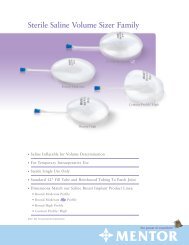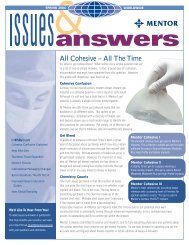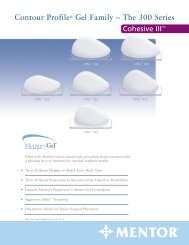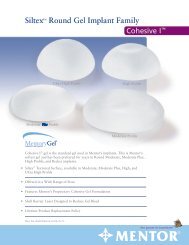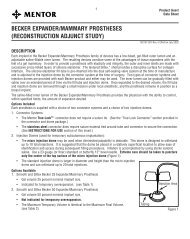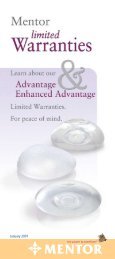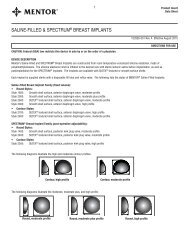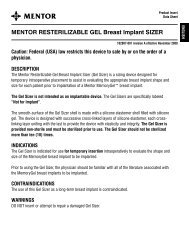Breast Reconstruction Patients Educational Brochure - Mentor
Breast Reconstruction Patients Educational Brochure - Mentor
Breast Reconstruction Patients Educational Brochure - Mentor
- No tags were found...
You also want an ePaper? Increase the reach of your titles
YUMPU automatically turns print PDFs into web optimized ePapers that Google loves.
31The Institute of Medicine (IOM) report (a comprehensive review of studies that looked atthe safety of silicone gel breast implants since they were introduced in 1962) showed thatbreast cancer is no more common in women with implants than those without implants.Some studies have suggested that breast implants may interfere with or delay breast cancerdetection by mammography and/or biopsy. However, other studies reported that breastimplants neither delayed breast cancer detection nor affected cancer survival. 20,28,29,30,31• Brain CancerMost studies of brain cancer in women with silicone gel breast implants have found noincreased risk. 19,21,23,26,27,28,32 One study reported a higher rate of brain cancer in womenwith breast implants, compared to the general population, 29,33 but, rates of brain cancerwere not significantly higher in women with breast implants when compared to womenwho had other non-breast implant plastic surgeries.• Lympho-Hematopoietic CancersLympho-hematopoietic cancers are cancers that develop in the lymph nodes or certainblood cells. Lymph nodes and the affected cells are part of the body’s immune systemto fight infection. These kinds of cancers include non-Hodgkin’s lymphoma, Hodgkin’sdisease, multiple myeloma, and leukemia. Although most studies have found no increasedrisk of these cancers for women with silicone gel breast implants. 19,21,23,26,27,28 some reportshave suggested a possible association between a type of anaplastic large cell lymphoma(ALCL) and breast implants. 34Anaplastic Large Cell LymphomaWomen with breast implants may have a very small, but increased risk of developinganaplastic large cell lymphoma, or ALCL, in the scar tissue and fluid adjacent to theimplant. ALCL is not breast cancer—it is a rare type of non-Hodgkin’s lymphoma (cancerof the immune system).ALCL has been reported globally in patients with an implant history that includes<strong>Mentor</strong>’s and other manufacturers’ breast implants.Most patients were diagnosed when they sought medical treatment for implant-relatedsymptoms such as pain, lumps, swelling, or asymmetry that developed after their initialsurgical sites were fully healed. In the cases reported, ALCL was typically diagnosed yearsafter the implant surgery.Your physician should consider the possibility of ALCL if, after your surgical site is fullyhealed, you see changes in the way the area around the implant looks or feels—includingswelling or pain around the implant. If ALCL is suspected, your physician will refer youto an appropriate specialist for evaluation which may involve obtaining fluid and tissuesamples from around your breast implant. If ALCL is confirmed, your physician will developan individualized treatment plan for you. Because of the small number of cases worldwideand variety of available treatment options, there is no single defined treatment.If you have breast implants and have no symptoms, you do not need to do anythingadditional, but you should continue to routinely monitor your breast implants and followyour routine medical care. Removing the implants is not recommended in women with nosymptoms without a diagnosis of ALCL.If you do not currently have breast implants but are considering breast implant surgery,you should discuss the risks and benefits with your health care provider. You may also visitthe FDA’s <strong>Breast</strong> Implants website for additional information.For additional and the most up-to-date information please visit:www.fda.gov/MedicalDevices/ProductsandMedicalProcedures/ImplantsandProsthetics/<strong>Breast</strong>Implants/ucm239995.htm





